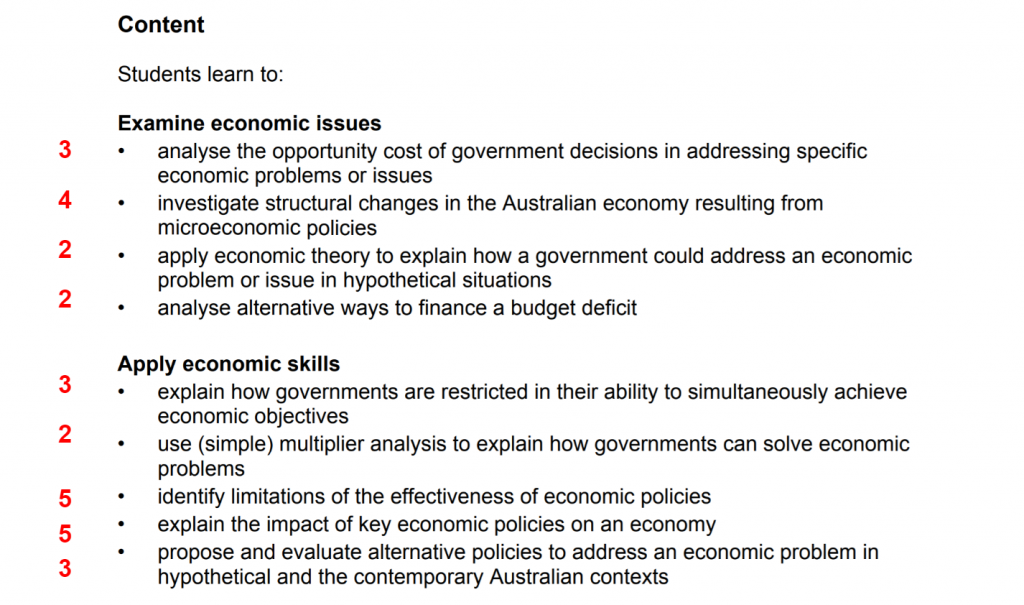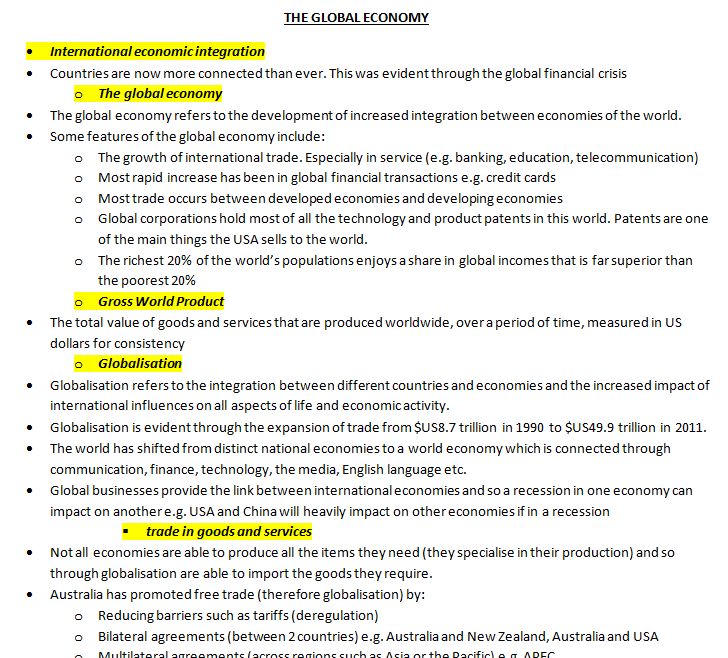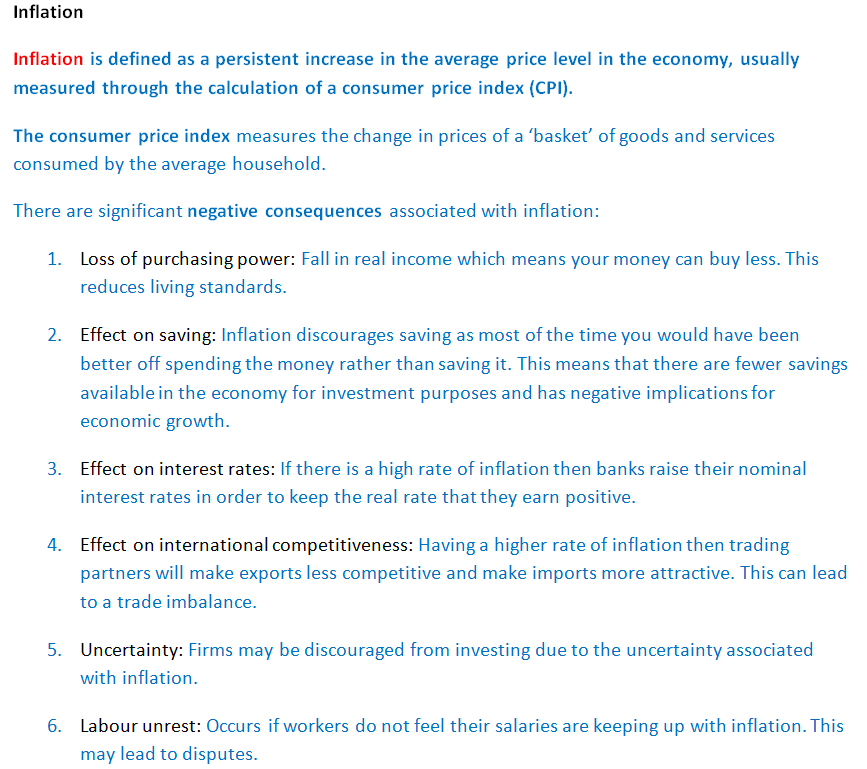You wake up, breathing heavy and in an absolute panic. Why? Because you have your Economics exam in 7 days and you don’t have a HSC Economics study plan!
But don’t worry — we’ve got you covered! We’ve come up with a study schedule that consists of 6 session of 25 minutes of study a day — which makes everything completely manageable!
This will help you get through content but also avoid you burning yourself out. It’s time to work smarter, not harder!
So, what are you waiting for? Let’s jump into our 7-day study plan for HSC Economics!
Day 1: Organisation
Day 2: Refine your Study Notes to Exam Notes
Day 3: Summarise your Study
Day 4: Practise Writing Extended Responses
Day 5: Practise the Multiple Choice Section
Day 6: Mark Multiple Choice and Move on to Short Answer
Day 7: Final Review
Day 1: Organisation
Day 1 is a great day for you to get organised and complete a needs assessment on yourself. (No, I’m not talking about you needing a new phone). This is the day where you consolidate what you do/don’t know.
Step 1: Grab a copy of the HSC Economics Syllabus
If you haven’t already, grab a copy of the HSC Economics Syllabus here! Print out pages 31 – 41 inclusive.
Step 2: Grab your exam notification
Now is the time to work out what topics will be in your exam.
For example, if you are studying for your Trials, you will normally not have covered Topic 4.
Step 3: Work through each line of the content
Under ‘students learn about’, write a number between 1 and 5 for each dot-point.
5 is ‘I can teach my friend this dot point’ and 1 is ‘okay, you’re going to have to tell me everything’.
Once I know something completely, i.e. once I’ve written a 5, I like to highlight the whole dot-point to mark off that I know it.
Your syllabus should end up looking something like this:
Step 4: Find your study notes
They should be somewhere…
If they’re not finished you need to spend the rest of the time on your first day getting them in order!
If you’ve already got your study notes organised, then you are a champion. Well done for now.
Day 2: Refine your Study Notes to Exam Notes
The main aim of today is to read through your study notes, and as you revise each topic, make exam notes.
These are far more concise than your study notes as they are designed to help you remember the key points.
For more information about exam and study notes, check out this article!
Here is an example of my study notes and exam notes! I like to highlight the syllabus points to make sure my notes are easily organised and make sense.
Your study notes should be comprehensive and cover the entire syllabus, whereas your exam notes should be specific and to the point.
Day 3: Summarise your Study
Now that you have finished your exam notes (if not, they MUST be done by today!) you should be feeling more comfortable with the course content.
Visit the HSC Economics Syllabus again and change any numbers that you feel more confident about from 1s, 2s, 3s to 4s, or 5s.
But don’t just rewrite what you’ve already got! Re-visualise them!
- Rewrite key definitions
- Write out key points
- Feel comfortable creating economic diagrams (i.e. exchange rates, supply and demand)
Day 4: Practise Writing Extended Responses
There’s three days left until the exam, but congrats! You’ve made it halfway through your HSC Economics study plan!
Your notes should now be in order and by now you have revised the course content once or twice. It’s now time to start putting pen to paper.
I advise you to start practising the Economics Extended responses. Why? Because they are the hardest to revise by yourself and they really test your knowledge of the content.
Choose 3 questions from each of the topics here and write an introduction to each question.
Include all the points you would talk about, do not use the syllabus or your notes. Try to remember everything that should be included in each response.
Feel free to write out a longer answer but remember that often the hardest part about the extended responses is starting well, so practice this!!
Day 5: Practise the Multiple Choice Section
Choose 6 of the past papers from this tabular list below and complete the multiple choice section (without any notes).
That’s 120 questions — you’ve got this though. Try and take 20 minutes or less for each one multiple choice section.
Multiple choice questions are a great way to test and refine your knowledge, but don’t mark them today!
We’ll do this tomorrow — it’s better to just complete them all today. Trust me.
Day 6: Mark Multiple Choice and Move on to Short Answer
Today you will spend the first half of your study marking yesterday’s answers to the multiple choice sections and then you will move on to the short answer.
The reason why we wait until today is that sometimes we can’t figure out why a multiple choice question is incorrect and so it’s nice tackling it with a fresh mind.
After you’ve corrected the multiple choice and understand how you got a few incorrect it’s time to move on to the short answer section.
I want you to choose one of the past papers and complete a short answer section and write thorough answers.
However, give yourself 10% less time than you’ll have in the actual exam. This will help you to feel more prepared for your actual exam and you’ll feel less rushed in the exam room.
Why practise in timed conditions?
Timing is everything. It’s critical that all your practice responses occur under timed conditions. Why though?
- You’ll be familiar with the types of questions they could throw at you as you’ll develop pattern recognition;
- You’ll be able to respond to these questions quickly and adapt all your knowledge to the specific question;
- You’ll have all your formulae, examples and more memorised; and…
- You’ll have time to spare to check your answers!
Make sure you mark yourself honestly and look at how you can improve.
Day 7: Final Review
Today is your last chance to review anything that you are not sure of.
Run through the syllabus one last time and you’ll find that it will start becoming so familiar. I’d done this so many times during my HSC that there was a point where I could recall every word in the syllabus!
And if your friends have any questions about the content, then take some time (not too much don’t get distracted) to help them.
Since teaching is one of the best ways for us to learn as well, you’ll find that your friends will be happier and you’ll be smarter!
And now that wraps up our 7 Day Study Plan for HSC Economics. Good luck! Most of all, remember that you can do this.
Need more study plans?
Check out more of our Study Plans below for subjects aside from HSC Economics!
- The 7 Step Plan for Studying for Multiple Exams
- The 7 Day Study Plan for HSC Standard and Advanced English
- The 7 Day Study Plan for HSC Legal Studies
- The 7 Day Study Plan for HSC Advanced Mathematics
- The 7 Day Study Plan for HSC Standard Mathematics
- The 7 Day Study Plan for HSC Ancient History
- The 7 Day Study Plan for HSC Biology
- The 7 Day Study Plan for HSC Chemistry
- The 7 Day Study Plan for HSC Visual Arts
Looking for some extra help with HSC Economics?
We pride ourselves on our inspirational HSC Economics coaches and mentors!
We offer tutoring and mentoring for Years K-12 in a variety of subjects, with personalised lessons conducted one-on-one in your home or at one of our state of the art campuses in Hornsby or the Hills!
To find out more and get started with an inspirational tutor and mentor get in touch today!
Give us a ring on 1300 267 888, email us at [email protected] or check us out on TikTok!
Thomas Woolley loves Economics and Business Studies. He completed his HSC in 2013 and has been working at Art of Smart since 2014. He enjoys helping out his students whilst studying B Commerce / B Education at UNSW to become an actual economics/business studies teacher in 2018. Since high school Thomas has also learned to scuba dive, salsa dance, and he can fly a quadcopter like a pro. However, he still cannot skateboard.






